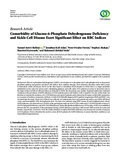UGSpace Repository
Comorbidity of Glucose-6-Phosphate Dehydrogenase Deficiency and Sickle Cell Disease Exert Significant Effect on RBC Indices
JavaScript is disabled for your browser. Some features of this site may not work without it.
| dc.contributor.author | Antwi-Baffour, S. | |
| dc.contributor.author | Adjei, J.K. | |
| dc.contributor.author | Forson, P.O. | |
| dc.contributor.author | Akakpo, S. | |
| dc.contributor.author | Kyeremeh, R. | |
| dc.contributor.author | Seidu, M.A. | |
| dc.date.accessioned | 2019-05-23T10:39:21Z | |
| dc.date.available | 2019-05-23T10:39:21Z | |
| dc.date.issued | 2019-03 | |
| dc.identifier.other | https://doi.org/10.1155/2019/3179173 | |
| dc.identifier.uri | http://ugspace.ug.edu.gh/handle/123456789/30240 | |
| dc.description.abstract | Background. Glucose-6-phosphate dehydrogenase (G6PD) converts glucose-6-phosphate into 6-phosphogluconate in the pentose phosphate pathway and protects red blood cells (RBCs) from oxidative damage. Their deficiency therefore makes RBCs prone to haemolysis. Sickle cell disease (SCD) on the other hand is a hereditary blood disorder in which there is a single nucleotide substitution in the codon for amino acid 6 substituting glutamic acid with valine. SCD patients are prone to haemolysis due to the shape of their red blood cells and if they are deficient in G6PD, the haemolysis may escalate. Reported studies have indicated variations in the prevalence of G6PD deficiency in SCD patients and as such further work is required. The aim of this study was therefore to estimate the incidence of G-6-PD deficiency among SCD patients and to determine its impact on their RBC parameters as a measure of incidence of anaemia. Methods. A total of 120 clinically diagnosed SCD patients of genotypes HbSS and HbSC were recruited into the study. About 5ml of blood was collected via venipuncture from each patient and used to run G6PD, full blood count, and haemoglobin (Hb) electrophoresis tests. The data were analyzed using SPSS version 20 and Graphpad prism. Result. G6PD deficiency was detected in 43 (35.83%) of the participants made up of 16 (13.33%) males and 27 (22.50%) females of whom 17 (14.17%) had partial deficiency and 10 (8.33%) full deficiency. Statiscally significant differences p=0.036 and p=0.038 were established between the Hb concentration of the participants having a G6PD deficiency and those with normal G6PD activity for males and females, respectively. Conclusion. From the results obtained, it implies that G6PD deficiency may increase the severity of anaemia in SCD patients. There is therefore the need to screen all SCD patients for G6PD deficiency to ensure that their condition is not exacerbated during treatment. | en_US |
| dc.language.iso | en | en_US |
| dc.publisher | Anemia | en_US |
| dc.title | Comorbidity of Glucose-6-Phosphate Dehydrogenase Deficiency and Sickle Cell Disease Exert Significant Effect on RBC Indices | en_US |
| dc.type | Article | en_US |
